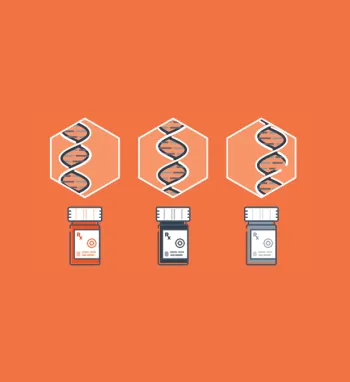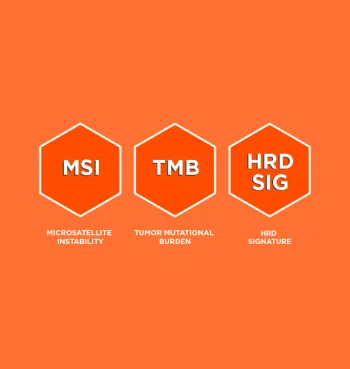A single test analyzes guideline-recommended genes in solid tumors, including companion diagnostic indications with a direct path to therapy. FoundationOne CDx also has national coverage for qualifying Medicare and Medicare Advantage patients across all solid tumors.†
FoundationOne®CDx
FoundationOne®CDx
FoundationOne®CDx is the first FDA-approved tissue-based broad companion diagnostic (CDx) that is clinically and analytically validated for all solid tumors. The test is designed to provide physicians with clinically actionable information - both to consider appropriate therapies for patients and understand results with evidence of resistance – based on the individual genomic profile of each patient’s cancer.
Test results include microsatellite instability (MSI) and tumor mutational burden (TMB) to help inform immunotherapy decisions, and HRD signature for all solid tumors. You can also order PD-L1 immunohistochemistry (IHC) testing# as an optional add-on test. Foundation Medicine’s test portfolio enables you to easily reflex FoundationOne CDx, a tissue-based test, to FoundationOne®Liquid CDx, a blood-based test, or vice versa.‡
Coverage includes:
- National coverage for qualifying Medicare1 and Medicare Advantage2 patients across all solid tumors.3
- 80 commercial health plans cover one or more Foundation Medicine tests.
87% -- or nearly 9 out of 10 patients -- pay $0 for testing.4
Test Features
Companion Diagnostic Indications
| Biomarkers | FDA-Approved Therapy§ |
|---|---|
| EGFR exon 19 deletions & EGFR exon 21 L858R alterations | EGFR Tyrosine Kinase Inhibitors (TKI) Approved by FDA§ |
| EGFR exon 20 T790M alterations | TAGRISSO® (osimertinib) |
| ALK rearrangements | ALECENSA® (alectinib), ALUNBRIG® (brigatinib) XALKORIX® (crizotinib), or ZYKADIA® (ceritinib) |
| BRAF V600E | BRAFTOVI® (encorafenib) in combination with MEKTOVI® (binimetinib). TAFINLAR® (dabrafenib) in combination with MEKINIST® (trametinib) |
| MET single nucleotide variants (SNVs) and indels that lead to MET exon 14 skipping | TABRECTA® (capmatinib) |
| ROS1 fusions | ROZLYTREK® (entrectinib) |
| Biomarkers | FDA-Approved Therapy§ |
|---|---|
| BRAF V600E | BRAF Inhibitors approved by FDA§ |
| BRAF V600E or V600K | MEKINIST® (trametinib) or BRAF/MEK Inhibitor Combinations approved by FDA§ |
| BRAF V600 mutation-positive | TECENTRIQ® (atezolizumab) in combination with COTELLIC® (cobimetinib) and ZELBORAF® (vemurafenib) |
| Biomarkers | FDA-Approved Therapy§ |
|---|---|
| ERBB2 (HER2) amplification | HERCEPTIN® (trastuzumab), KADCYLA® (ado-trastuzumab-emtansine), or PERJETA® (pertuzumab) |
| PIK3CA C420R, E542K, E545A, E545D [1635G>T only], E545G, E545K, Q546E, Q546R, H1047L, H1047R, and H1047Y alterations | PIQRAY® (alpelisib) in combination with fulvestrant |
| AKT1 E17K; PIK3CA R88Q, N345K, C420R, E542K, E545A, E545D, E545Q, E545K, E545G, Q546E, Q546K, Q546R, Q546P, M1043V, M1043I, H1047Y, H1047R, H1047L, and G1049R; and PTEN alterations | TRUQAP™ (capivasertib) in combination with FASLODEX® (fulvestrant) |
| Biomarkers | FDA-Approved Therapy§ |
|---|---|
| KRAS wild-type (absence of mutations in codons 12 and 13) | ERBITUX® (cetuximab) |
| KRAS wild-type (absence of mutations in exons 2, 3, and 4) and NRAS wild type (absence of mutations in exons 2, 3, and 4) | VECTIBIX® (panitumumab) |
| Biomarkers | FDA-Approved Therapy§ |
|---|---|
| BRCA1, BRCA2 alterations | LYNPARZA® (olaparib) |
| Biomarkers | FDA-Approved Therapy§ |
|---|---|
| FGFR2 fusions and select rearrangements | PEMAZYRE® (pemigatinib) |
| Biomarkers | FDA-Approved Therapy§ |
|---|---|
| Homologous Recombination Repair (HRR) gene (ATM, BRCA1, BRCA2, BARD1, BRIP1, CDK12, CHEK1, CHEK2, FANCL, PALB2, RAD51B, RAD51C, RAD51D and RAD54L) alterations | LYNPARZA® (olaparib) |
| BRCA1, BRCA2 alterations | AKEEGA® (niraparib + abiraterone acetate) |
| BRCA1, BRCA2 alterations | LYNPARZA® (olaparib) in combination with abiraterone |
| Biomarkers | FDA-Approved Therapy§ |
|---|---|
| MSI-High | KEYTRUDA® (pembrolizumab) |
| TMB ≥ 10 mutations per megabase | KEYTRUDA® (pembrolizumab) |
| NTRK1/2/3 fusions | ROZLYTREK® (entrectinib), VITRAKVI® (larotrectinib) |
| RET fusions | RETEVMO® (selpercatinib) |
| Biomarker(s) Detected | Therapy |
|---|---|
| BRAF V600 mutation-positive and BRAF fusions | Ojemda™ (tovorafenib) |
FoundationOne®CDx Resources
- Test Requisition Form (TRF)
- Test Requisition Form Explained
- FoundationOne CDx Technical Specifications (Gene List)
- FoundationOne CDx Specimen Instructions
- FoundationOne CDx Product Features
- Medicare ABN
- ABN Decision Tree (Solid Tumors)
- FoundationOne CDx Technical Information (FDA Label)
We Have Even More to Offer
Learn more about our comprehensive genomic profiling tests or explore our solutions for clinical development and companion diagnostics (CDx) or access and commercialization.
Questions? We’re Here to Help
Please contact our client services team by phone at
+1(888) 988-3639 or by email at the link below.
Additional Notes
# PD-L1 by Immunohistochemistry (IHC) can be ordered as a supplemental test and may inform eligibility for several immunotherapies across different cancer types
‡ When “Portfolio Reflex” is selected on the test requisition form (TRF), Foundation Medicine will proceed with the initial test and if the specimen does not meet the criteria for successful testing, we will automatically reflex to the other test and procure a new specimen.
¶ Loss of Heterozygosity (LOH) status reported for ovarian cancer only § For the most current information about the therapeutic products in this group, go to: https://www.fda.gov/medical-devices/in-vitro-diagnostics/list-cleared-or-approved-companion-diagnostic-devices-in-vitro-and-imaging-tools#Group_Labeling
1. Medicare administered by federal government.
2. Medicare administered by private insurers.
3. For FoundationOne®CDx and FoundationOne®Liquid CDx, see “Decision for Next Generation Sequencing (NGS) for Medicare Beneficiaries with Advanced cancer –CAG-00450R.” (See Appendix B) available in the Medicare Coverage Database, https://www.cms.gov/medicare-coverage-database/new-search/search.aspx.
4. Data on File, Foundation Medicine, Inc., 2022. Based on US settled claims from 1/1/21 to 3/31/22 for all CGP and IHC tests offered by Foundation Medicine and reported during that time before considering any financial assistance. 64% of commercially insured and 97% of Medicare and Medicare Advantage patients had a $0 financial responsibility for Foundation Medicine testing. Some patients may have higher financial responsibility.
5. From specimen receipt to report
*Cotellic®, Herceptin®, Kadcyla®, Perjeta®, Rozlytrek® , Tecentriq® and Zelboraf® are registered trademarks of Genentech, Inc. Faslodex®, Lynparza®, Tagrisso®, and Truqap™ are registered trademarks of the AstraZeneca group of companies. Xalkorix® is a registered trademark of Pfizer Inc. Zykadia®, Tafinlar®, and Mekinist® are registered trademarks of Novartis AG Corporation Switzerland. Retevmo® is a registered trademark owned or licensed by Eli Lilly and Company. Erbitux® is a registered trademark of ImClone LLC, a wholly owned subsidiary of Eli Lilly and Company. Alecensa® is a registered trademark of Chugai Seiyaku Kabushiki Kaisha. Vectibix® is a registered trademark of Immunex Corporation. Piqray® is a registered trademark of Novartis AG. Pemazyre® is a trademark of Incyte. Tabrecta® is a trademark of Novartis. Keytruda® is a registered trademark of Merck. Exkivity® and Alunbrig® are a registered trademark of Takeda Pharmaceuticals International AG. Vitrakvi® is a registered trademark of Bayer Healthcare Pharmaceuticals Inc. Braftovi® is a registered trademark of Pfizer Inc. Mektovi® is a registered trademark of Array BioPharma Inc. Akeega® is a trademark of Janssen Biotech, Inc. Ojemda™ is a registered trademark of Day One Biopharmaceuticals.
Important Safety Information
FoundationOne®CDx and FoundationOne®Liquid CDx are qualitative next-generation sequencing based in vitro diagnostic tests for advanced cancer patients with solid tumors and are for prescription use only. FoundationOne CDx utilizes FFPE tissue and analyzes 324 genes as well as genomic signatures. FoundationOne Liquid CDx analyzes 324 genes utilizing circulating cell-free DNA and is FDA-approved to report short variants in 311 genes. The tests are companion diagnostics to identify patients who may benefit from treatment with specific therapies in accordance with the therapeutic product labeling. Additional genomic findings may be reported and are not prescriptive or conclusive for labeled use of any specific therapeutic product. Use of the tests does not guarantee a patient will be matched to a treatment. A negative result does not rule out the presence of an alteration. Some patients may require a biopsy for testing with FoundationOne CDx when archival tissue is not available which may pose a risk. When considering eligibility for ROZLYTREK® based on the detection of NTRK1/2/3 and ROS1 fusions, or for TEPMETKO® based on the detection of MET SNVs and indels that lead to MET exon 14 skipping, testing using plasma specimens is only appropriate for patients for whom tumor tissue is not available for testing. Patients who are tested with FoundationOne Liquid CDx and are negative for other companion diagnostic mutations should be reflexed to tumor tissue testing and mutation status confirmed using an FDA-approved tumor tissue test, if feasible. For the complete label, including companion diagnostic indications and important risk information, please visit www.F1CDxLabel.com and www.F1LCDxLabel.com.


